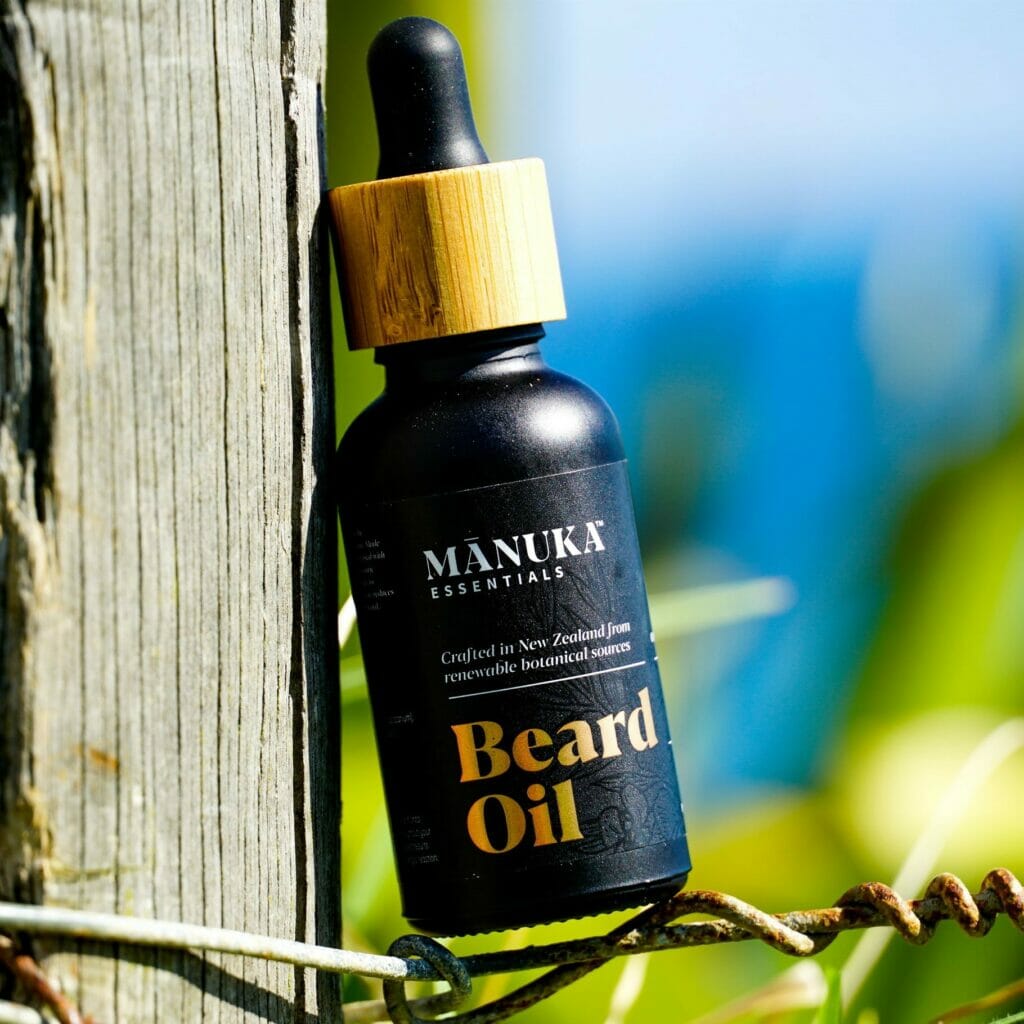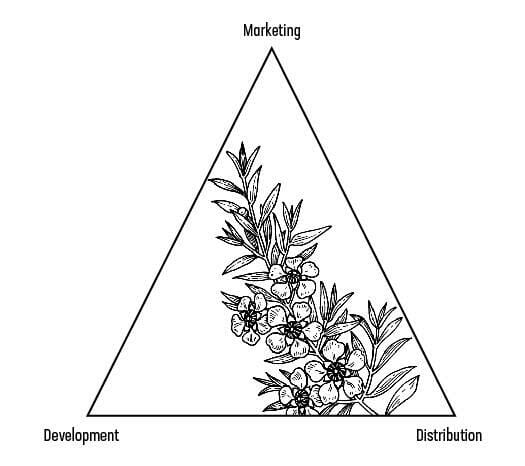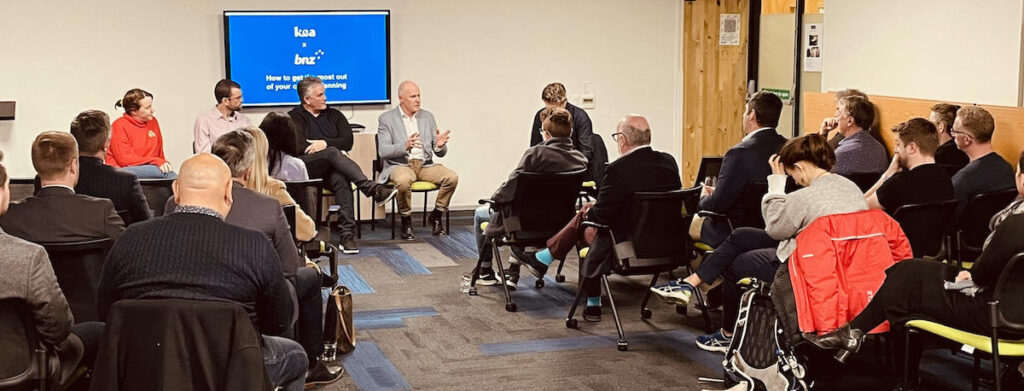
Tell us about yourself and what Re-Leased is?
Re-Leased is a cloud-based commercial property management software that automates and centralises the accounting and lease administration for commercial property managers. Our founder and CEO, Tom Wallace, was in the commercial property industry and observed that the status quo for landlords and property managers was to manage multi-million-dollar property portfolios on out-dated legacy software and spreadsheets. Re-Leased is a modern approach to managing commercial property that leads with automation, centralisation and mobility.
I started with Re-Leased in 2015 after a stint as an accountant with Fonterra and having a few small businesses. Tom and I were buddies from winning the under 7’s soccer league together in Palmerston North and going through part of university together. We happened to bump into each other at an airport in 2015 and I was really impressed with his ambition and approach to running Re-Leased, so I jumped on board! After spending time in New Zealand with Tom, I moved to London to set up the UK office. It has been an amazing journey, building a fast paced business with great people. The UK is Re-Leased’s fastest growing market with 30 staff across an office in London and Birmingham.
Did you and your team have global ambitions from day one?
Absolutely. We have always set Re-Leased up to be able to scale globally. We have developed our software, internal tools and processes with a long-term global mindset – intentionally avoiding shortcut decision making. We are very proud to be selling Re-Leased on the global stage.
Tell us about your experience with Kea Connect
We reached out to Kea when we landed in the UK as we knew we had to build our support networks as soon as possible. Tania Bearlsey and Kea have been invaluable for us. As well as introducing us to mentors, influencers and industry CEO’s; just having a familiar support network that you could call on was huge. Kea has:
- Introduced us to Ross McEwan, who at the time was CEO of Royal Bank of Scotland and made various other introductions to their World Class Network. These meetings were hugely valuable and assisted in guiding Re-Leased early on in respect to strategic decision making;
- Played a key role in connecting us to Kent Gardner and Paul Kendrick, Chief Executive and Chief Investment Officer at Evans Randall, who became one of our strategic investors;
- Introduced us to Former All Black Anton Oliver and Owen Eastwood, who have been or will be keynote speakers at our respective annual customer events;
- Organised for Re-Leased to host a breakfast with Kane Williamson where we invited our key clients and prospects;
- Held valuable networking events with World Class New Zealanders who are excelling on the world stage. These events are great for inspiration and networking
How has Re-Leased grown since first reaching out to Kea Connect in 2016?
From 2016 – 2020, UK Re-Leased has experienced a compound average growth rate of 115%, and grown from one staff member to a team of 30.
What are the key challenges, and mistakes (if any) you have faced in relation to Re-Leased?
Growing a global business very quickly at scale always has its challenges! However, we all encompass an entrepreneurial mindset where we learn and act decisively and are open to changing tack if it’s the best decision for the business. We make decisions with data and are always researching and learning from businesses and people that have been successful before us. Of course, we make mistakes. However, they are not seen as ‘failing’. We adapt quickly until we have it right and then move onto the next challenge/opportunity.
What was your approach to funding?
Our desire has always been to grow very fast but not at all costs. Although growing as fast as possible with our customers funding us has always been our number 1 option, we have also leveraged available government grants and have a handful of strategic investors. For example, Evans Randall who are respected Real Estate Investors that used to own the Gherkin in London are one of those strategic investors. They help our in-market credibility, open doors for us and offer industry advice and support. This multi-thread approach has allowed us to control the balance of growth and cash preservation.
What does your team structure look like geographically, and do you have advice for businesses looking to hire offshore?
We have 90 staff across 7 offices – Auckland, Napier, Melbourne, London, Birmingham, New York and Toronto.
Our product and development team are based in the Hawkes Bay’s Tech Collective. The other offices each have a mix of finance, marketing, sales, HR and implementation. We have recently transitioned from a regional operation to a functional one with ‘Heads of’ being responsible for their teams globally.
For reference, our CEO is based in Auckland, CFO is based in London, Head of Sales is based in New York, CTO is based in Napier and Head of People and Ops is based in Napier. We all travel to stay close to our markets.
When hiring offshore, we invest time upfront in getting our first hire right. Someone that fits the company culture and that you can build a strong and productive relationship with. You can then build a strong team around them – It helps if they have an existing network in-market.
What was your strategy for entering a market without established networks? Please share any advice for other entrepreneurs looking to do the same
We build strong relationships with our customers. Although the UK is a very big market, the commercial property industry is very relationship driven so everyone has heard of or knows everyone in one capacity or another.
Customers can teach you about the market, introduce you to prospects, introduce you to employee candidates and give you ideas for relevant marketing and product ideas. Building relationships with our customers has been invaluable and has made the journey really enjoyable. This is a must do for anyone entering a new market!
How has your go-to-market approach differed from NZ, compared to the USA, Aus, and UK? USA?
Typically, the entry into our respective markets have come off the back of Xero’s success in NZ, Australia, UK, Canada, US etc. Like Xero, we are educating a relatively traditional and conservative market on the benefits of cloud technology. One of our products integrates with Xero and fortunately for us, Xero has spent years and huge marketing resources educating the respective markets before us.
Before entering a market, we would understand the market opportunity and if there was potential for a strong product to market fit. Once we had a strong indication and were happy with our market research, we put 1 person on the ground to accelerate learnings and sales. We would then continue to invest in that market as long as we kept receiving positive commercial indications. This method prevented us from making big unknown bets up front.
Once we are in-market, the markets are all ‘relatively’ similar in terms of competitive landscape, property portfolio make up, property industry groups etc. However, we do need to invest in our product to get a strong product-to-market fit. In the first instance, we would typically have a 80% fit which is normally close enough for the early tech adopters in the respective market to kick off our momentum. From there, we roll out our ever-evolving go-to-market playbook to ensure we are successful in the market as fast and as effectively as possible.
What has the past year looked like?
Re-Leased has had it’s strongest year yet. We continue to grow in our respective markets where our brand, customer base, product and team is the strongest it has been. This is great timing for us as 2019 saw the market adopting cloud tech at an accelerated rate – This is very positive as our prospects move off legacy based software and spreadsheets. Importantly we are finding our place as thought leaders in property management.
We are very proud to have won a handful of awards being; Xero’s UK Industry app of the year, NZTE’s emerging business, Best of British Business, Best Place to work in property and have recently been nominated for the UK’s Industry Journal’s Proptech innovator of the year award.
Can you talk about resilience and perseverance when it comes to launching a business, and what advice could you offer on how to best look after yourself?
We are pioneering a new era in a very conservative and traditional industry so resilience and perseverance are two critical characteristics that everybody in our team needs. We have always focused heavily on the culture of our team; celebrating the small wins, holding each other to high expectations, finding a way to solve a problem and treating one another with respect.
If you have a team that supports each other and is united in accomplishing a single vision, it’s easier to manage the ups and downs of the process. Together, we do the small things well but always have one eye on the bigger picture.
HOW KEA CAN HELP YOUR BUSINESS GROW
Kea Connect
Kea Connect is a free service that will help your business grow offshore. We connect you personally with regional, sector-specific experts and peers.
Resources
Kea is here to help New Zealand businesses grow offshore. Be inspired and hear advice from businesses who have created their export path.
Jobs Portal
Looking for the right talent for your team? Reach our global Kiwi community through the Kea international job portal.

 MENU
MENU









